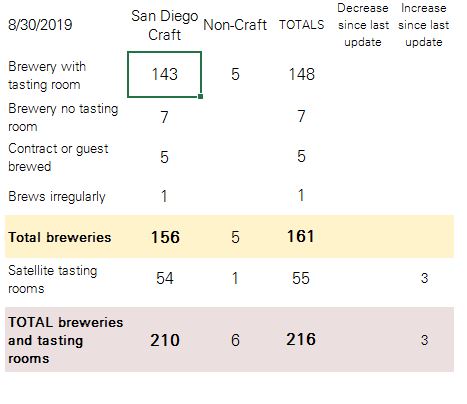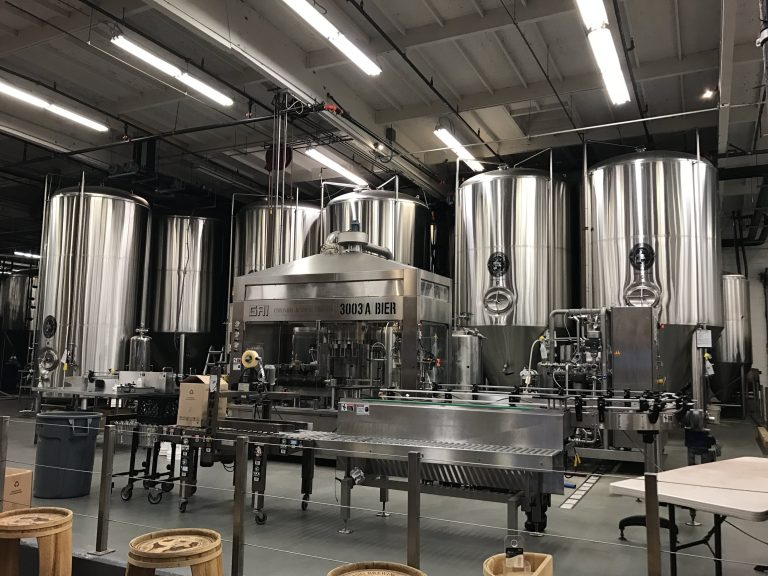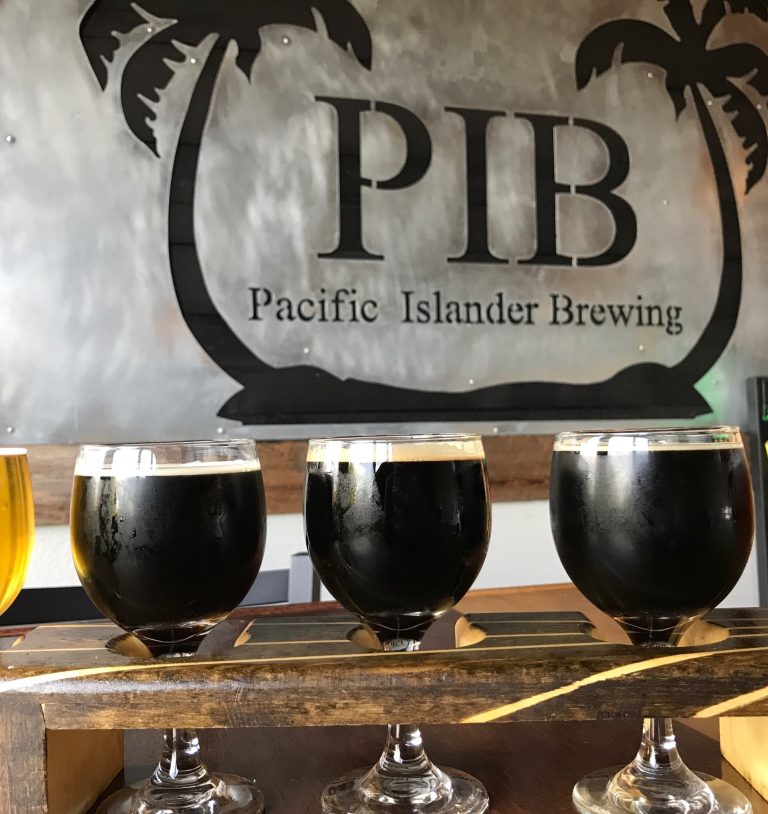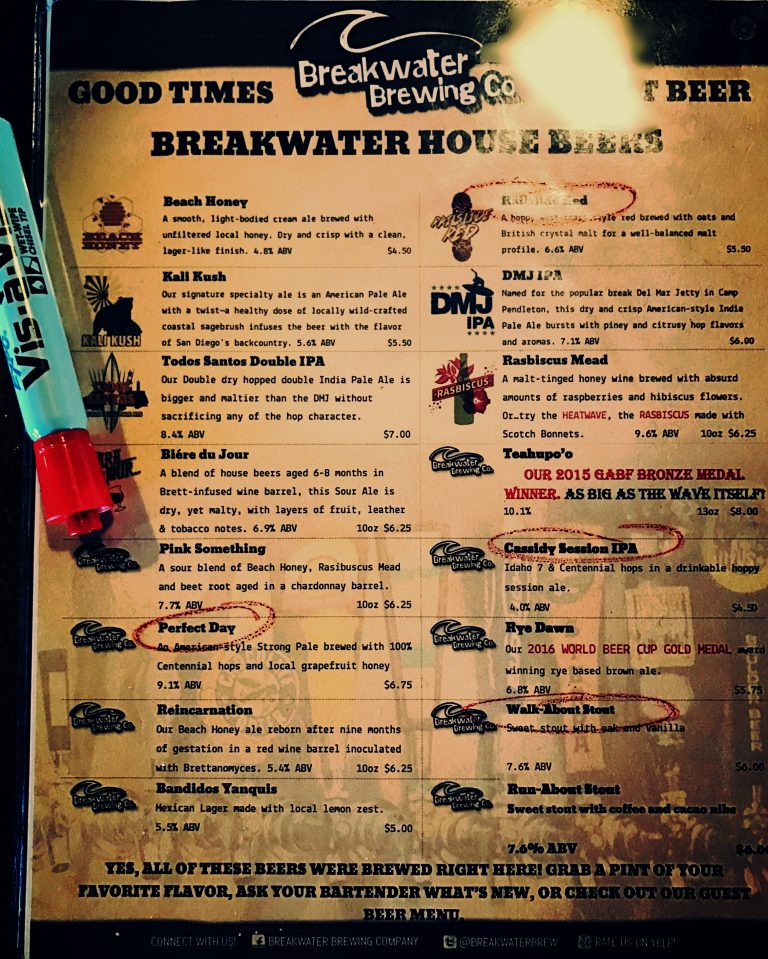Ballast Point, Little Italy
[The long discussion below is no longer relevant: In December 2019, Constellation Brands sold Ballast Point to Kings & Convicts Brewing from Illinois. The deal closes in March 2020, at which point Ballast will once again be a San Diego craft brewery.]
If you are well-entrenched in the craft beer world, you might be surprised—perhaps even offended—to see Ballast Point included in this blog about San Diego craft beer. In November 2015, Constellation Brands (owner of Corona and various other big beer properties) paid a cool $1 billion for Ballast Brewing. In virtue of that sale, Ballast no longer satisfies the Brewer’s Association definition of craft beer: its ownership is no longer “independent” of the major brewers and distributors.
Ballast Point has been a bastion of the San Diego craft beer scene for years, though. They continue to make high quality beer. They continue to innovate. They continue to operate tasting rooms that differ from others around San Diego County mainly in being larger, better run, and more popular. Just a year or so ago, Ballast Point was a feather in the cap of San Diego’s craft beer scene. Now that they are under different ownership, should we really not count them as “craft” anymore?
I admit to being torn on the issue. Jason McKean, CEO of Modern Times, wrote a great blog post about what selling out means. His conclusion is that there is no “beer-positive” reason to sell out, it is just a way to make money. In the eyes of many craft beer aficionados, the quest for money is often conducted by big beer at the expense of quality. And there are notorious problems with large corporations employing bad business practices to force smaller competitors out of the marketplace. The story arc of “craft beer becomes big beer and destroys craft beer” sounds like the plot of a dystopian fantasy novel. Or maybe Oedipus Rex.
I understand the idea behind the Brewer’s Association definition, I do. They were trying to codify a particular movement which was partly (perhaps even mainly) inspired and defined by being “not big beer” or “not corporate beer.” The implication was that the big brewers like Budweiser and Miller didn’t (still don’t) make “good” beer, they make lazy, mass-produced, low-quality beer for the unthinking hoi polloi. The fact that Big Beer makes a gazillion dollars doing it no doubt was also irksome to the anti-big-beer movement: most craft brewers barely scrape by. Big Beer’s predatory practices, in which they attempted to squeeze out smaller operations, were also offensive to the independents and their followers.
Still, when I hear the common craft complaint about breweries such as Ballast Point and Goose Island “selling out,” I hear a petulant note like that of the younger brother who gets mad and says, “I’m taking my ball and going home!” (If it was the wine industry, I probably would have used some pun on “sour grapes.”) Something feels off in how the craft industry is responding to the sale of once-one-of-us breweries, though I can’t quite put my finger on it yet.
This topic is one that has been percolating in my mind for awhile and I expect I’ll write something more about it another time. I’d like to hear your thoughts: please email or comment below. In the meantime, here’s my review of Ballast Point’s Little Italy location.
This very large location has two indoor seating areas, a large bar, and a really beautiful enclosed outdoor area. The whole place is well appointed and attractive. There’s a huge beer menu, and the food is quite good.
Early on a Monday evening there was a big crowd here, and it took a little while getting to the bar to order. Everyone seems to get a flight, so that slows things down. The food was reasonably priced–the special for a burger plus a pint for $10 is really good, and even the regular menu’s chicken-and-brie sandwich was only about $13.
The Commodore (American Stout, 6.5% ABV). This is very drinkable. It is malty, roasty and very pleasant. I could have several of these. 3.75/5
Tongue Buckler (Imperial Red Ale, 10% ABV). A little sweet, a little sour, a little cherry. It doesn’t taste nearly like 110 IBUs or I’ve killed my palate. 3.5/5
Black Marlin (Porter, 6% ABV). This is a good porter, one of my favorite styles. It checks all the boxes. Be on the lookout for the coffee version, too, which is also very good. 3.75/5
Sextant (Oatmeal Stout, 6% ABV). This is a straight-ahead stout. Perfectly fine but nothing special. 3.5/5
Victory at Sea (Imperial Coffee Porter, 10% ABV). This is very good. It is smooth, with flavors of caramel, toffee, roasty malts, cherry notes and coffee in the background. (The limited release bourbon barrel aged version of this gets rave reviews on Untappd but I haven’t tried it yet.) 3.75/5
The beer at Ballast Point Little Italy is solid, and there is a huge variety—FIFTY different Ballast beers on tap during my visit. I’ve never had anything I didn’t like from Ballast Point (though I certainly haven’t tried all fifty). I admire that they are constantly innovating. In fact, at this location you can get a few beers from an “Experimental” menu and be “in on the ground floor” to see how they develop new offerings. There are a few beers from Ballast Point that I think are really great, and most are very good. And most of the time that’s all I care about, even if they are officially “big beer” now.
Don’t forget to check out the small shop at the back for souvenir t-shirts, hats, mugs, and lots of other goodies, plus beer “to go.”
Take a Lyft or Uber—parking in Little Italy is ridiculous at the best of times.
Ballastpoint.com 2215 India St, San Diego, CA 92101


![Mason Ale Works, Oceanside [CLOSED]](https://beermaverick.com/wp-content/uploads/2017/08/IMG_2940-768x576.jpg)



